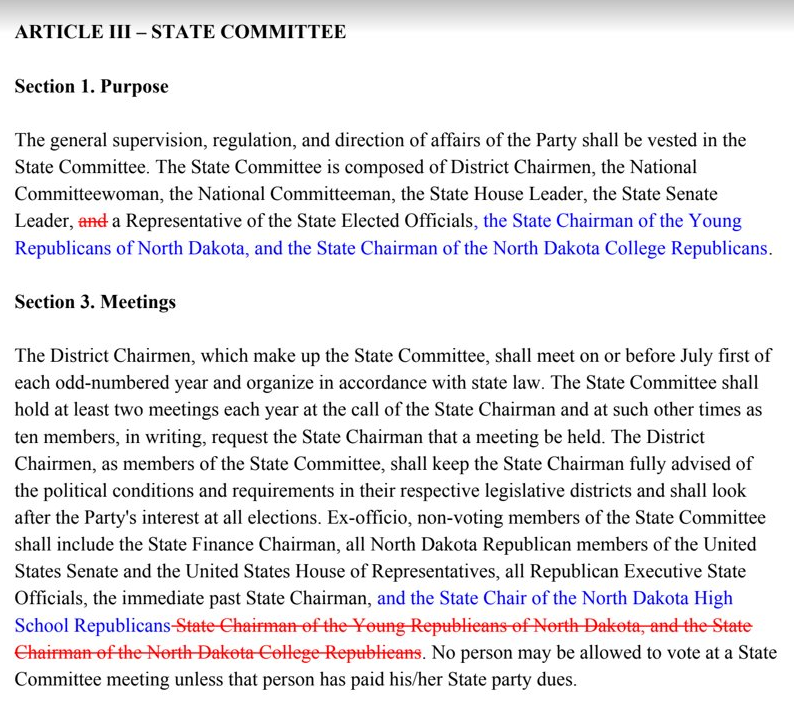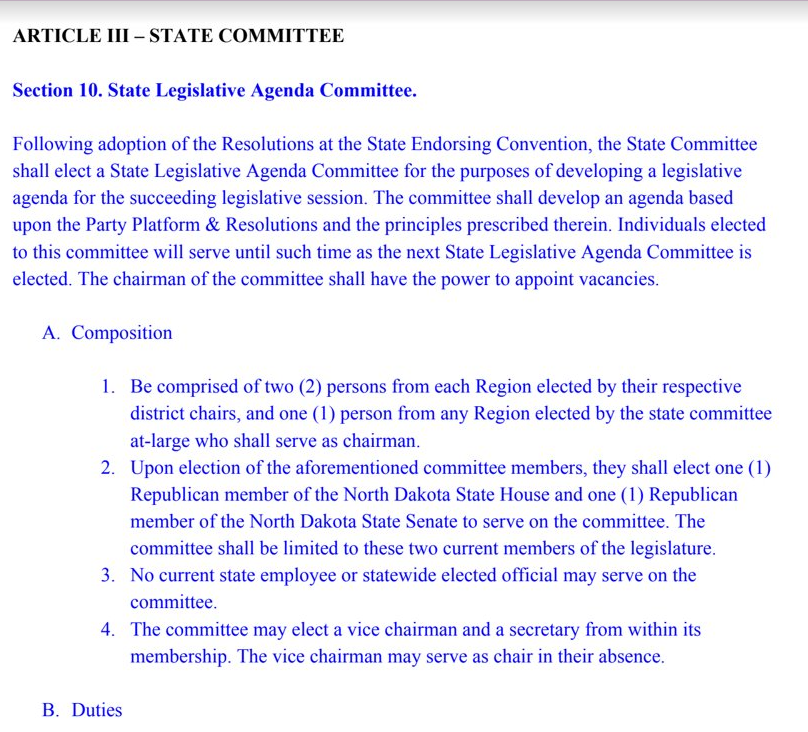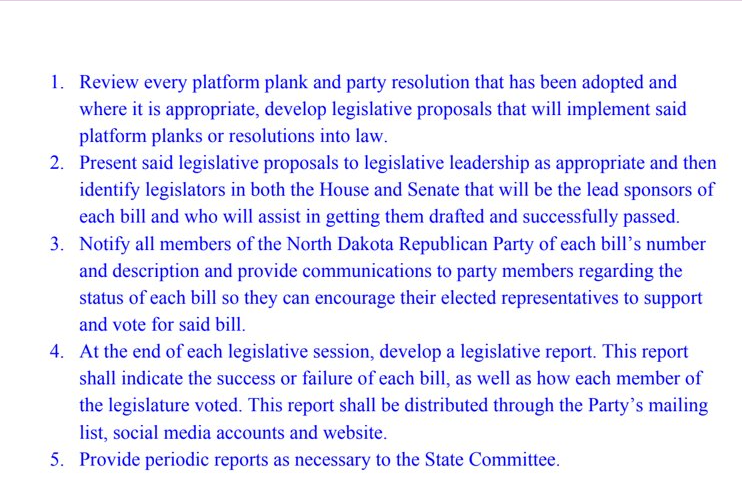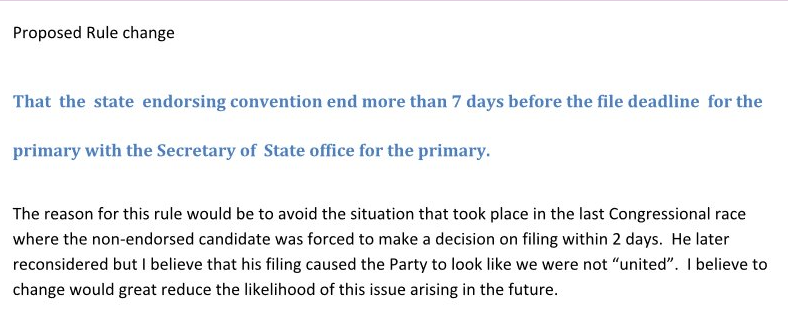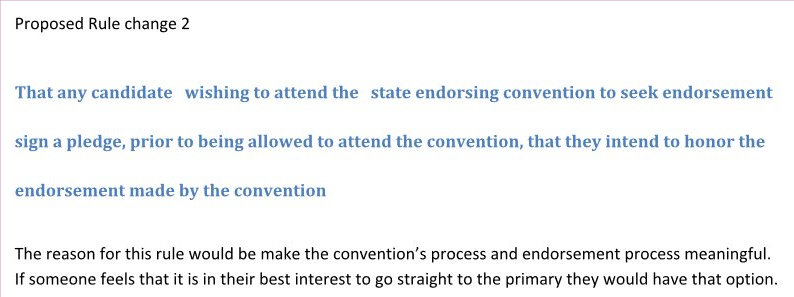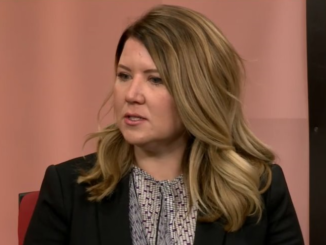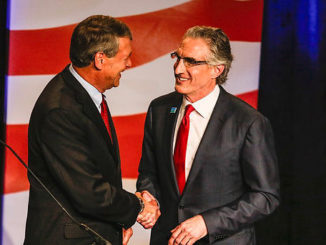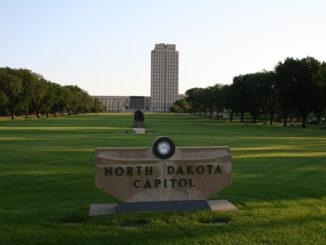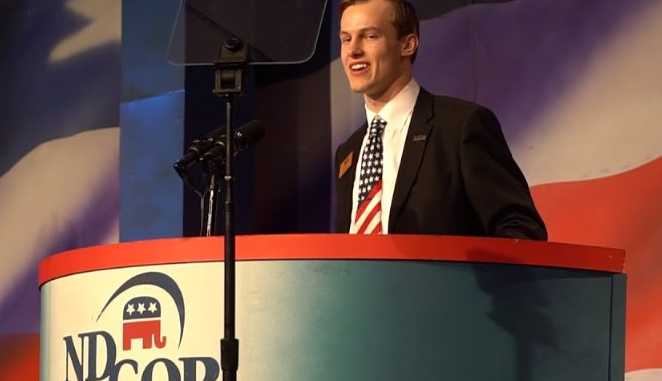
There seems to be a feeling spreading within the North Dakota Republican Party (NDGOP) that the party itself doesn’t really mean that much. To be more specific, it comes from the idea that many Resolutions and planks of the Platform, decided on by party faithful, have ultimately become pointless positions. In addition to this, some will tell you that conventions don’t really seem to matter either. These are things that some folks want to change.
The party’s Platform and Resolutions are supposed to indicate positions on key issues. Yet, we find far too many elected “Republicans” with voting records that don’t even come close to matching these positions of the NDGOP. When it comes to conventions — whether at the district or state level — their results aren’t binding. Candidates can choose to ignore their results — or bypass them altogether — enroute to challenging the party’s endorsed candidates in a primary.
Later this month, the NDGOP’s State Committee will gather in Bismarck to conduct business for the party. Aside from a variety of reports and election of officers, documentation provided to The Minuteman shows that committee members will be considering four changes that have the potential for interesting debate. These changes stem from District 38 Chairman Jared Hendrix and District 46 Chairman Mark Thelen.
Proposals from Jared Hendrix
Hendrix’s proposals are likely to be the most controversial. I’ll summarize them here and post each in their entirety at the conclusion of the article.
- Proposed Amendment Relating to the Makeup of the State Committee – this proposal is actually quite simple. Hendrix wants to add the State Chairman of the Young Republicans of North Dakota and the State Chairman of the North Dakota College Republicans as members of the State Committee. Let’s not forget that Hendrix was Deputy Campaign Manager during Kevin Cramer’s campaign for the U.S. Senate— a race that Cramer won handedly over incumbent Heidi Heitkamp. Senator Cramer himself credited Young Republicans with a “significant contribution” to his victory in this video for their convention prior to Christmas. With this army of young people doing so much to help candidates and grow the party, can the State Committee as it currently exists honestly reject the proposal to welcome the chairman’s of these organizations into their ranks?
- Proposed Amendment Relating to the Party’s Purpose & Platform – this proposal is a bit more involved. But if passed, after adoption of the Resolutions at the State Endorsing Convention, the State Committee would “elect a State Legislative Agenda Committee for the purposes of developing a legislative agenda for the succeeding legislative session.”This committee would be comprised of two people from each of the NDGOP’s four regions— elected by that region’s District Chairs. The committee’s chairman would be elected “at-large” by the State Committee. Upon the State Legislative Agenda Committee’s election, they would then elect one Republican member of the North Dakota State House and one Republican member of the North Dakota State Senate to round out the 11-member committee.The duties of the committee can essentially be boiled down to three things: #1 to develop and find sponsors for legislation according to the party’s Platform and Resolutions. #2 to develop a legislative report showing the results of each bill and how each member of the legislature voted on them. And #3 to keep members of the North Dakota Republican Party updated on each piece of legislation throughout the process.
My Thoughts on Hendrix’s Proposals
I see no reason to deny Hendrix’s proposal to add the State Chairman of the Young Republicans of North Dakota and the State Chairman of the North Dakota College Republicans as members of the State Committee. Considering the fact that these organizations are arms of the North Dakota Republican Party and are actively engaged in recruiting members and assisting candidates, why shouldn’t they be represented? Yet, I won’t be surprised if there’s opposition to the idea. After all, I think the younger generation of Republicans represent something quite different than the establishmentarians in power at the moment.
It is Hendrix’s second proposal that is likely to garner disdain from some of those on the State Committee. After all, it would undoubtedly affect Senate Majority Leader Rich Wardner (R – District 37) and House Majority Leader Chet Pollert (R – District 29). And since Governor Doug Burgum may end up with some of this legislation crossing his desk, it affects him as well. All three are members of the State Committee that will hear the proposal on June 15th. I’m guessing none of them will be excited about it.
Is the proposal unreasonable though? I don’t believe that it is. If a party — a private organization — is going to take positions on key issues, what’s wrong with measuring how those who represent the party vote in relation to them? And let’s not forget, Hendrix’s proposal doesn’t include — or even suggest — a mechanism to penalize those legislators who don’t align with the Platform and Resolutions. His proposal is really one of activism, transparency, and to some degree accountability. If the NDGOP is unwilling to embrace such things, then why do they even exist?
Proposals from Mark Thelen
Thelen’s proposal’s both involve changes relating to State Conventions. Like Hendrix’s, I will post both in their entirety at the conclusion of the article. They’re fairly simple. Yet, the debate could prove interesting as well.
- Proposal to Change End Date for State Conventions – this proposal would require that State Endorsing Conventions end more than seven days prior to the filing deadline for candidates wishing to participate in primary elections.The reason for this change “would be to avoid the situation that took place in the last Congressional race where the non-endorsed candidate was forced to make a decision on filing within 2 days.” This no doubt refers to former State Senator Tom Campbell, who initially declared for the U.S. Senate race but later switched to the U.S. House race. Campbell lost to now Congressman Kelly Armstrong at the State Convention, in April of 2018, and had to make a quick decision whether to run in the primary. Initially, Campbell decided to do so and filed the paperwork, but not long after ended his campaign and threw his support to Armstrong. Campbell’s name still appeared on the primary ballot though. According to Thelen, he believed that Campbell’s filing caused the Party to look like they were not “united” and that this change would “reduce the likelihood of this issue arising in the future.”
- Proposal to Require Pledge Honoring Results of State Conventions – it’s exactly as it sounds. Those candidates choosing to participate in the State Convention would be required to “sign a pledge”, prior to their attending the convention, stating that they “intend to honor the endorsement made by the convention.” The purpose of this rule change would be to make the convention’s process “meaningful”. Yet, nothing would prohibit a candidate from bypassing the convention and going straight to the primary. In reality, nothing could stop them from breaking their pledge either.
My Thoughts on Thelen’s Proposals
Thelen’s proposals are interesting from this perspective— the first could be interpreted as indicating he believes the second is unlikely to pass. After all, if a candidate is required to “sign a pledge” that says they won’t run in the primary, what difference would it make how close to the primary’s filing deadline the State Convention ended?
In and of itself, Thelen’s first proposal may generate some discussion but probably won’t be overly controversial. The State Committee will have to weigh the pros and cons of potentially allowing a candidate — who’s been defeated at the convention — more time to decide whether they’ll challenge the endorsed candidate in a primary election for the party’s nomination. Each candidate may be affected differently by the rule change. So, I’m not sure there’s a definitive answer of whether it’s a good idea or not.
Thelen’s second proposal is likely to be controversial. You may recall that back in December the State Committee shot down a resolution that would have called upon the Legislature to pass a bill allowing political parties in North Dakota to determine for themselves how they nominate their candidates. In other words, it called for permitting governing bodies within political parties to decide whether conventions or primaries would determine their nominees.
While Thelen’s proposed rule change is admittedly nothing like the resolution defeated in December, it is — as previously stated — submitted in the same spirit of making the convention “meaningful”. As I mentioned at the beginning of this article, there’s a growing number of people who are disillusioned with the convention process. When candidates attempt to bolster their campaigns by attending a State Convention, only to be defeated and still move on to the primary, it leaves some delegates (i.e. party members) wondering why they bothered participating in the convention process at all.
Concluding Thoughts
The discussions that will come as a result of these four proposals are worthy of having. In my opinion, there’s an identity crisis of sorts going on within the party. And rightfully so. At the heart of it is the question of whether it really means anything to be a North Dakota Republican? If there’s no satisfactory answer to that question, then perhaps there’s no point in participating in the party structure after all.
PLEASE LIKE & SHARE!
Sources:
- https://ndgop.org/state-committee/
- https://www.youtube.com/watch?v=YRXcT0crje8
- https://theminutemanblog.com/2018/12/13/breaking-ndgop-state-committee-shoots-down-rule-change-on-primaries1/
